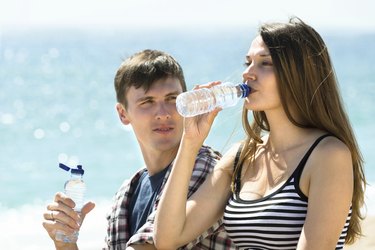
Getting enough of the recommended daily amount of essential minerals and vitamins is key for optimal health and body function. While some vitamins dissolve in water, your body will retain the nutrients it needs. Thus, while drinking water and other fluids will increase urination, it will not lead to the loss of necessary vitamins; rather, it will help you stay hydrated. To ensure you get enough vitamins, eat a balanced diet that gives your body the nutrients it needs.
Water-Soluble Vitamins
Video of the Day
Water-soluble vitamins dissolve in water and, unlike fat-soluble vitamins, are not stored in your body. You body will eliminate these vitamins through urine if they are not used, so you need a regular intake to meet your daily needs. Vitamin C and the B vitamins--thiamine, riboflavin, niacin, vitamin B-6, folic acid, vitamin B-12, biotin and pantothenic acid--are water-soluble. Deficiencies in these vitamins are rare in the United States unless you have a medical complication, are an alcoholic, are on a restricted-calorie diet or are elderly.
Video of the Day
Urination and Vitamins
If you consume water-soluble vitamins and your body requires them, your body will make use of the essential nutrients first before the excess is excreted. Because of this, you can increase your consumption of water-soluble vitamins without any potential for toxicity, as the vitamins are not stored in your body. Indeed, water-soluble vitamins are dissolved in liquid and then absorbed, sometimes very quickly and easily, into your bloodstream, so there is little chance of vitamin loss from urination.
Staying Hydrated
While drinking more water will increase how often you urinate, staying hydrated is key to good health. MedlinePlus recommends you drink between six and eight 8-ounce glasses of fluids a day -- more if you have been exercising or if you are exposed to hot or humid weather. Getting enough fluids is important for organ function as water is needed for all bodily processes. While water is the ideal fluid, you can also hydrate with juices and teas. MedlinePlus recommends avoiding alcohol and caffeinated drinks as they may cause excess urination.
Sources of Water-Soluble Vitamins
Vitamin C is found in high quantities in sweet peppers and citrus fruits, including citrus juice. The recommended intake of vitamin C ranges from 75 to 90 milligrams per day. Water-soluble B vitamins are also present in many plant foods, especially dark leafy greens, whole grains and legumes. However, some B vitamins, including vitamin B-12, are found in higher quantities in animal products, which may make it difficult for vegetarians and vegans to get the required amount. However, many foods, such as cereals and grain products, are fortified with these vitamins.